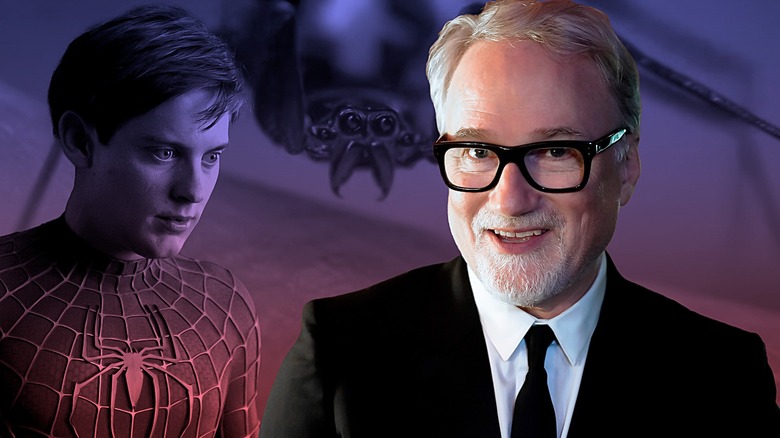David Fincher's Failed Marvel Movie Pitch 'Eviscerated' Spider-Man In One Key Way
A colorful comic book movie seems worlds away from the gritty visions conjured up by famed director David Fincher. Nevertheless, the "Se7en" and "Fight Club" helmsman was initially among the names tapped to take on the Spider-Man film that had been in development throughout the 1990s. But even if Fincher was an admitted fan of the iconic Marvel character, there were still elements he contended with that ultimately cost him the job.
While speaking with The Guardian about his upcoming film "The Killer," itself based on a French comic book series by Alexis Nolent, Fincher shared his experience of pitching his Spider-Man concept in 1999. Having been an avid comic reader during his childhood, the director had shown interest in the project but was not fond of how Peter Parker received his powers. However, his attempts to remove the radioactive spider bite from the story were poorly received. "They weren't f**king interested," Fincher said. "And I get it. They were like: 'Why would you want to eviscerate the origin story?' And I was like: 'Cos it's dumb?' That origin story means a lot of things to a lot of people, but I looked at it, and I was like: 'A red and blue spider?' There's a lot of things I can do in my life, and that's just not one of them."
Some reports state that Fincher would have tackled the infamous "The Night Gwen Stacy Died" story arc had he had his way. While he ultimately exited the project for his differing viewpoints on these classic elements, another filmmaker's drastic change would stay intact.
James Cameron's Spider-Man alteration made it into the final film
After going through the hands of such cult creators as Roger Corman, Tobe Hopper, and Albert Pyun, James Cameron became the first major director to tackle the Spider-Man project once the rights were given to Carolco Pictures. He handed in his initial screenplay in 1993, which viewed Peter Parker's powers in a more symbolic light. Cameron described his vision to ScreenCrush as " ... that untapped reservoir of potential that people have that they don't recognize in themselves. And it was also in my mind a metaphor for puberty and all the changes to your body, your anxieties about society, about society's expectations, your relationships with your gender of choice that you're attracted to, all those things."
This notion led to the concept of Spider-Man organically shooting webbing out of his wrists, a significant difference from the mechanical web-shooters from the comics. The change would remain in Sam Raimi's version. Unfortunately, Carolco went under not long after Cameron's pitch. Following a failed attempt at convincing 20th Century Fox to buy the rights, the director left the project and instead took on "Titanic."
Once Sony Pictures got the Spider-Man rights in 1999, the hunt was on for a filmmaker. Such names as Tim Burton, Chris Columbus, Michael Bay, and Barry Sonnenfeld were tossed about before Raimi convinced the Sony heads he was the man for the job. We may never know what a Spider-Man flick from the minds of David Fincher or Cameron may have looked like, but it's hard to say Sony regretted the decision when Raimi's vision webbed up over $820 million worldwide in 2002.

